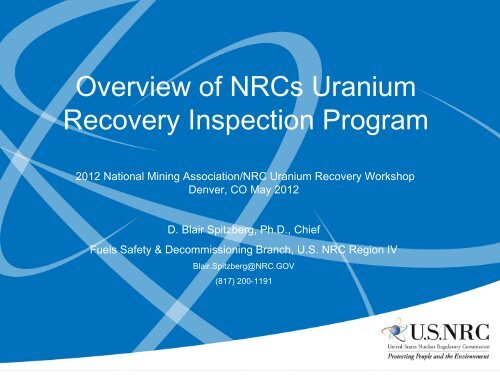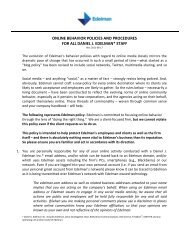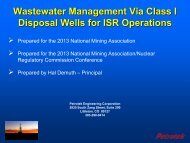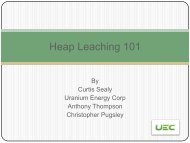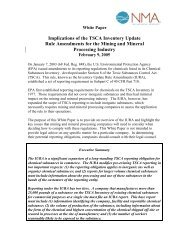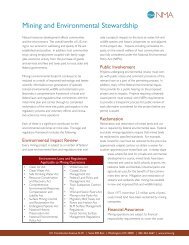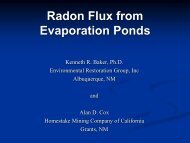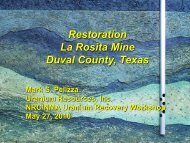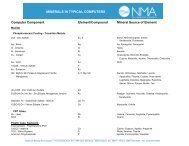Overview of NRCs Uranium Recovery Inspection Program
Overview of NRCs Uranium Recovery Inspection Program
Overview of NRCs Uranium Recovery Inspection Program
You also want an ePaper? Increase the reach of your titles
YUMPU automatically turns print PDFs into web optimized ePapers that Google loves.
<strong>Overview</strong> <strong>of</strong> <strong>NRCs</strong> <strong>Uranium</strong><br />
<strong>Recovery</strong> <strong>Inspection</strong> <strong>Program</strong><br />
2012 National Mining Association/NRC <strong>Uranium</strong> <strong>Recovery</strong> Workshop<br />
Denver, CO May 2012<br />
D. Blair Spitzberg, Ph.D., Chief<br />
Fuels Safety & Decommissioning Branch, U.S. NRC Region IV<br />
Blair.Spitzberg@NRC.GOV<br />
(817) 200-1191
Key Messages<br />
• <strong>Inspection</strong> <strong>Program</strong> - No significant changes in the inspection arena from<br />
previous year<br />
• Organization - The Region works to implement programs defined and<br />
funded by the NRC Headquarters <strong>Program</strong> Offices<br />
• <strong>Inspection</strong> Process - <strong>Inspection</strong>s are planned and led by Region IV<br />
inspectors with support as needed from technical staff from FSME<br />
• We are prepared to conduct inspections <strong>of</strong> new or restart operations<br />
• Whenever NRC becomes aware <strong>of</strong> incidents at licensed facilities, a review<br />
will be initiated with the possibility <strong>of</strong> follow-up<br />
2
Organizational Responsibility -<br />
<strong>Inspection</strong> <strong>of</strong> <strong>Uranium</strong> <strong>Recovery</strong><br />
• Office <strong>of</strong> Federal and State Materials and Environmental Management<br />
<strong>Program</strong>s (FSME) (NRC Headquarters, Rockville, MD) – program lead<br />
• Decommissioning and <strong>Uranium</strong> <strong>Recovery</strong> Licensing<br />
Directorate (FSME)<br />
• Develops, implements and oversees the regulatory framework<br />
for uranium recovery activities and the decommissioning <strong>of</strong><br />
former uranium recovery sites<br />
• Region IV – Division <strong>of</strong> Nuclear Materials Safety (Arlington,<br />
Texas)<br />
• <strong>Inspection</strong> and enforcement, respond to events (funded by<br />
FSME)<br />
• Currently resides in the Fuels Safety and Decommissioning<br />
Branch<br />
• Currently 2 trained and qualified inspectors with one in<br />
training<br />
• Other inspectors assist according to technical expertise<br />
needed
<strong>Overview</strong> <strong>of</strong> <strong>Inspection</strong> <strong>Program</strong><br />
Types <strong>of</strong> <strong>Inspection</strong>s<br />
• Routine – programmatic inspections conducted at a risk-informed<br />
frequency<br />
– Annual or semi-annual frequency for operational facilities<br />
– Every two years at facilities in reclamation and standby, unless operating<br />
conditions or performance indicates otherwise.<br />
– Every three years at inactive facilities.<br />
• Non-routine – inspections focused on a particular area or concern<br />
which cannot await the routine schedule. Includes reactive<br />
inspections.<br />
• Incident investigations<br />
• Pre-operational – new or restarted operations
<strong>Inspection</strong> Guidance<br />
NRC INSPECTION Manual Chapter 2641<br />
NRC INSPECTION Manual Chapter 2801<br />
<strong>Inspection</strong> Procedures (IPs) generally<br />
conducted during all routine inspections<br />
IN-SITU LEACH FACILITIES INSPECTION PROGRAM<br />
URANIUM MILL AND 11e.(2) BYPRODUCT MATERIAL DISPOSAL SITE AND<br />
FACILITY INSPECTION PROGRAM<br />
<strong>Inspection</strong> Procedures conducted as needed<br />
IP 83822 Radiation Protection IP 83890 Closeout <strong>Inspection</strong> & Survey<br />
IP 88045 Effluent Control and Environmental Protection IP 92701 Follow-up<br />
IP 89001 In-Situ Leach Facilities IP 92703 Follow-up <strong>of</strong> confirmatory Action Letters<br />
IP 86740 <strong>Inspection</strong> <strong>of</strong> Transportation Activities IP 93001 OSHA Interface Activities<br />
IP 88035 Radioactive Waste Management IP 88065 Incident Investigation<br />
IP 88005 Management Organization and Controls IP 87654 <strong>Uranium</strong> Mill Site Decommissioning <strong>Inspection</strong>s<br />
IP 87102 Maintaining Effluents from Materials Facilities ALARA IP 87104 Decommissioning Procedure for Materials Licensees<br />
IP 88050<br />
IP 88064<br />
IP 88055<br />
Emergency Preparedness<br />
Emergency Response Procedures<br />
Fire Protection<br />
NRC Manual Chapters and <strong>Inspection</strong>s Procedures can be<br />
found at:<br />
http://www.nrc.gov/reading-rm/doc-collections/inspmanual/manual-chapter
<strong>Inspection</strong> Planning and Communications<br />
• Routine inspection schedule<br />
– Planned about a year in advance<br />
– Coordinated with the program <strong>of</strong>fice in FSME<br />
– Adjustments to schedule made throughout the year as needed<br />
• <strong>Inspection</strong>s may be announced or unannounced<br />
– Most inspections are announced to ensure appropriate inspection interfaces are available<br />
• <strong>Inspection</strong> plan approved by Region IV management<br />
– Identifies scope, IPs, follow-up issues, participating personnel<br />
• State <strong>of</strong>ficials informed<br />
– on occasion State representatives may accompany NRC inspectors as observers with<br />
agreement from licensee<br />
• Entrance/Exit Meetings<br />
– Any changes in findings from those communicated in the final exit will require re-exiting with<br />
licensee management
Post <strong>Inspection</strong> Activities<br />
• Post inspection debrief <strong>of</strong> NRC management and staff<br />
– Generally week <strong>of</strong> return to <strong>of</strong>fice<br />
• Ship any samples to NRC contractor lab for analysis<br />
• Coordinate any enforcement<br />
– See NRC enforcement policy<br />
http://pbadupws.nrc.gov/docs/ML0934/ML093480037.pdf<br />
• Issue <strong>Inspection</strong> Report<br />
– 30 day goal for normal inspection reports (post exit)<br />
– 45 day goal for team inspections (post exit)<br />
• Determine need for any follow-up
Region IV Contacts<br />
• Blair Spitzberg, Chief, Fuels Safety and Decommissioning Branch<br />
– Blair.Spitzberg@nrc.gov<br />
– (817) 200-1191<br />
• Rob Evans, Sr. Health Physicist, FCDB<br />
– Robert.Evans@nrc.gov<br />
– (817) 200-1234<br />
• Linda Gersey, Health Physicist, FCDB<br />
– Linda.Gersey@nrc.gov<br />
– (817) 200-1299<br />
• Send correspondence to:<br />
Tony Vegal, Director, Division <strong>of</strong> Nuclear Materials Safety<br />
U.S. Nuclear Regulatory Commission, Region IV<br />
1600 East Lamar Blvd.<br />
Arlington, TX 76011-4511<br />
• Region IV main switchboard (817) 860-8100
NRC Incident/Event Response<br />
• For uranium recovery and related licensees, NRC may become aware <strong>of</strong> incidents or events<br />
by several mechanisms including:<br />
– Licensee notifications required by regulation or license<br />
– Other regulatory agencies<br />
– Routine contact with licensee representatives<br />
– Workers at the site<br />
– Members <strong>of</strong> the public<br />
– News media<br />
• It is the policy <strong>of</strong> the NRC to ensure that significant operational events are investigated in a<br />
timely, objective, systematic, and technically sound manner; that the factual information<br />
pertaining to each event is documented; and that the cause or causes <strong>of</strong> each event are<br />
ascertained.<br />
• For events/incidents which are not considered significant, NRC may review and close them<br />
by normal internal review or inspection follow-up.<br />
What is a significant operational event
What Initiates an NRC Incident Investigation<br />
NRC Management Directive 8.3, “NRC Incident Investigation <strong>Program</strong>”<br />
• “Incident investigation” is a formal process conducted for the purpose <strong>of</strong> accident prevention. The process<br />
includes gathering and analyzing information; determining findings and conclusions, including the cause(s)<br />
<strong>of</strong> a significant operational event; and disseminating the investigation results for NRC, industry, and public<br />
review.<br />
• Delineates criteria for NRC conducting investigations according to potential significance using one <strong>of</strong> the<br />
following investigation modalities:<br />
• Incident Investigation Team (IIT)<br />
• Augmented <strong>Inspection</strong> Team (AIT)<br />
• Special <strong>Inspection</strong><br />
• By policy, all NRC incident investigations will be announced publicly and to the media<br />
• Incident Investigation reports are publicly available<br />
• NRC conducted one Special <strong>Inspection</strong> during 2011 at an operational uranium recovery facility<br />
• The Special <strong>Inspection</strong> was initially evaluated according to Management Directive 8.3 to involve:<br />
“circumstances sufficiently complex, unique, or not well enough understood…, or involved<br />
characteristics the investigation <strong>of</strong> which would best serve the needs and interests <strong>of</strong> the<br />
Commission.”<br />
• No violations were identified.
Coming soon – NRC Observational Site Visits <strong>of</strong><br />
UMTRCA Title I and Title II Sites


